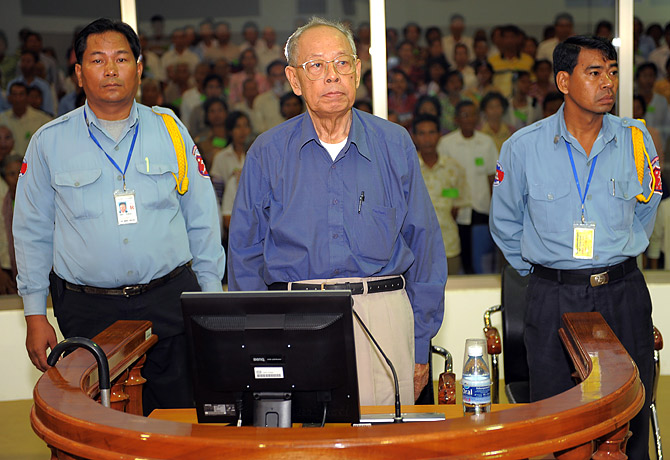
Ieng Sary, former Khmer Rouge Deputy Prime Minister and Minister of Foreign Affairs, stands in the courtroom during a public hearing at the Extraordinary Chambers in the Court of Cambodia on April 30, 2010
(2 of 2)
Defense lawyers yesterday said they expected to appeal and reiterated their lack of confidence in the investigation, which Michael Karnavas, an American lawyer who is defending Ieng Sary, the former Minister of Foreign Affairs, has called "a disappointment from the very beginning."
Michiel Pestman, a Dutch lawyer defending Nuon Chea, said the Khmer Rouge had largely been convicted already in the court of public opinion. "I am certainly not defending monsters — I am defending people," he said by telephone after the indictments were announced. "We are used to fighting public perception. That is why it's so important that we have an impartial and fair trial."
In appealing for funding, administrators at the Extraordinary Chambers in the Courts of Cambodia, as the tribunal is officially known, which is facing weak financial support and a $10 million budget shortfall this year, have described the trials likely to begin next year as the most complex ever prosecuted. Hopes of bringing significant numbers of those responsible to justice were always slim: of seven members of the Communist Party's standing committee in 1975, five were killed by the regime itself during broad purges of suspected enemies in 1978.
In the intervening years, the architects and soldiers of the regime escaped justice by dying: Pol Pot, the secretive Khmer Rouge Prime Minister known as Brother No. 1, died in 1998 in a remote Khmer Rouge redoubt near the Thai border. A year earlier, he had ordered the assassination of his former Defense Minister, Son Sen, along with his family. Pol Pot's wife, Khieu Ponnary, died in 2003. Ke Pauk, secretary of the Central Zone, died in 2002. The feared Southwest Zone secretary Ta Mok died of complications from tuberculosis while in a military prison in 2006, and former Commerce Minister Van Rith, suspected of sending staff members to their deaths at the hands of the secret police, died quietly in the countryside outside Phnom Penh in 2008.
Van Rith had been the subject of preliminary inquiries by U.N. prosecutors as part of a separate case that is opposed by the Cambodian government, which maintains that no more than five suspects will be tried. With Thursday's indictments, the court has reached that maximum. Van Rith died as Cambodian prosecutors objected to U.N. prosecutors' plans to open a new case in which he would have been included.
For Youk Chhang, director of the Documentation Center of Cambodia, a local organization that supplied much of the court's documentary record, the case is the most important the court will ever conduct, regardless of what becomes of any additional cases opened by U.N. prosecutors. "The question is, Why did Cambodians kill Cambodians? That is the most important question that has been put forward, and only Case 002 can do that," Youk says, using the case number for Thursday's indictment. It "would lead us to what is next," he says. "It will trickle down how far you can go."
